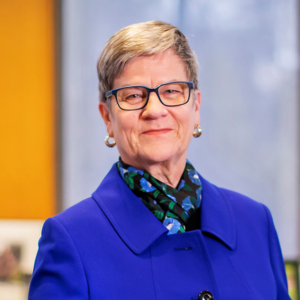Kathleen Hall Jamieson is a professor of communication who studies political, science, and health communication through rhetorical analysis, surveys, and experiments. She is also the cofounder of FactCheck.org, a nonprofit website that provides original research on misinformation and hoaxes, and the director of The Constitution Project, a series of educational films on the U.S. Constitution.
Professional positions
- 1993–present: Walter and Leonore Annenberg Director, Annenberg Public Policy Center at the University of Pennsylvania
- 1989–present: Elizabeth Ware Packard Professor of Communication, Annenberg School of Communication at the University of Pennsylvania
- 1989–2003: Dean, Annenberg School of Communication at the University of Pennsylvania
- 1986–1989: G.B. Dealey Regents Professor of Communication, University of Texas at Austin
- 1971–1986: Assistant, associate, and full professor, University of Maryland
Notable publications
- Jamieson, Kathleen Hall. 2020 [2018]. Cyberwar: How Russian Hackers and Trolls Helped Elect a President – What We Don’t, Can’t, and Do Know, 2nd edition. New York, NY: Oxford University Press.
- Jamieson, Kathleen Hall, Dan Kahan, and Dietram A. Scheufele, eds. 2017. The Oxford Handbook of Political Communication. New York, NY: Oxford University Press.
- Campbell, Karlyn Kohrs, and Kathleen Hall Jamieson. 2008 [1990]. Presidents Creating the Presidency: Deeds Done in Words, 2nd edition. Chicago, IL: University of Chicago Press.
- Cappella, Joseph N., and Kathleen Hall Jamieson. 1997. Spiral of Cynicism: The Press and the Public Good. New York, NY: Oxford University Press.
Degrees
- PhD, communication arts, University of Wisconsin–Madison
- MA, communication arts, University of Wisconsin–Madison
- BA, rhetoric and public address, Marquette University

